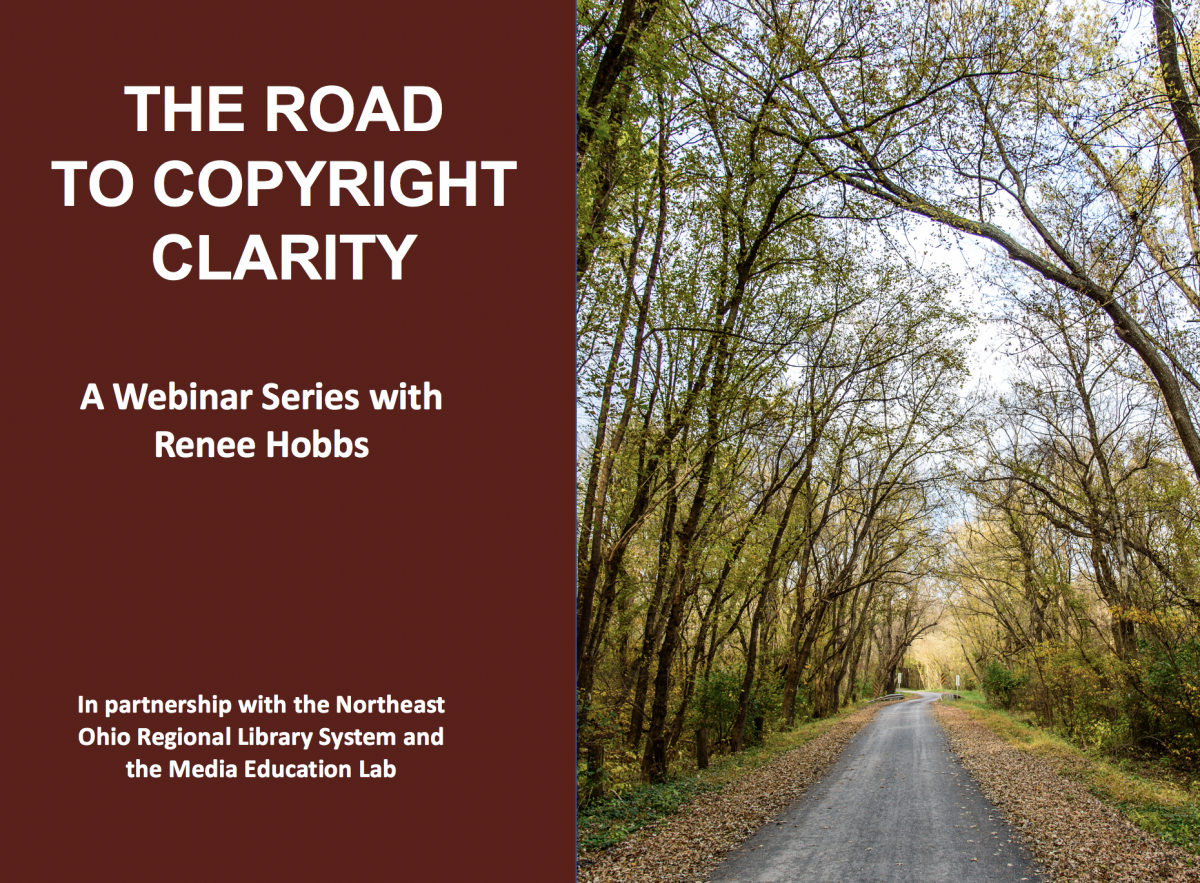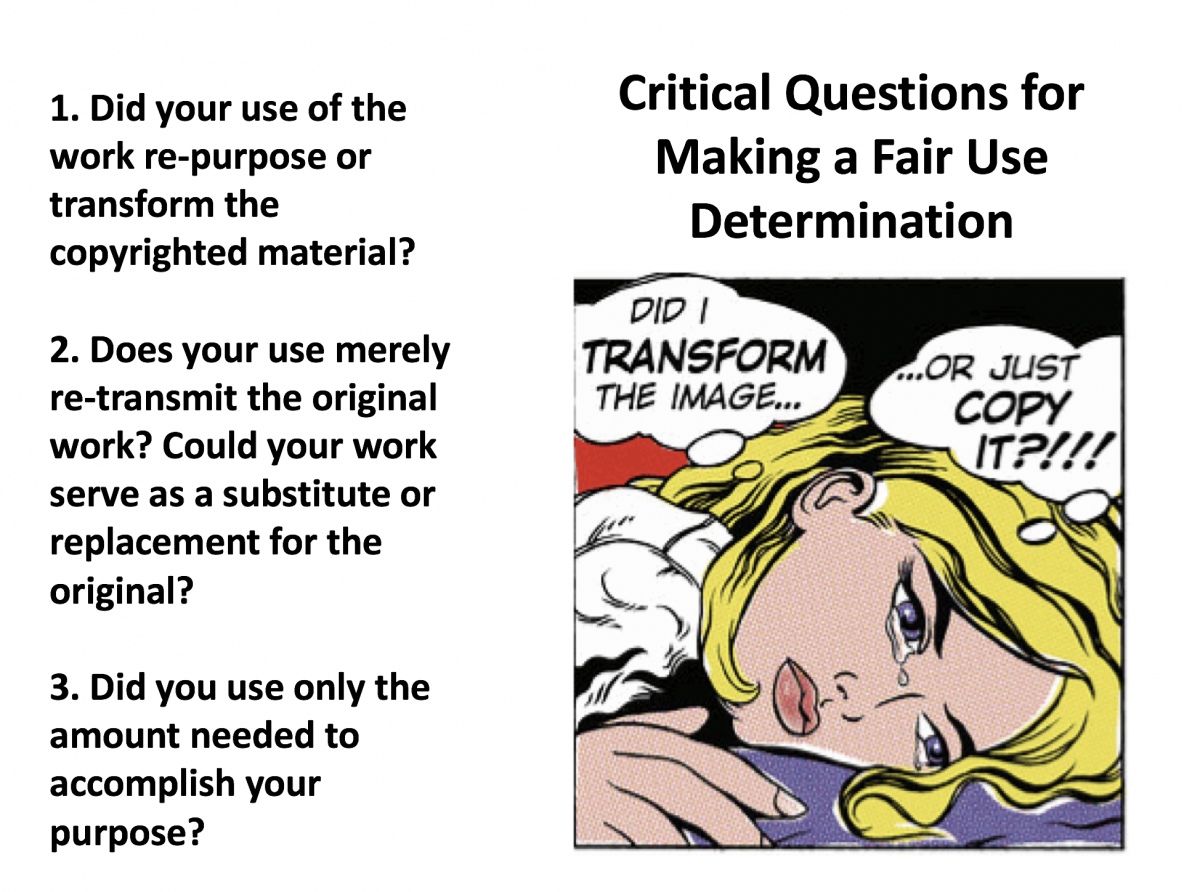Demonstrates "Best Practices" for Teaching & Learning about Copyright and Fair Use
THE ROAD TO COPYRIGHT CLARITY
Presenter: Renee Hobbs, Author of Copyright Clarity: How Fair Use Supports Digital Learning
A Collaboration between the Northeast Ohio Regional Library System and the Media Education Lab
 Do you have questions about how copyright and fair use affect you or your patrons? Renee Hobbs will introduce key ideas about copyright as it applies to the work of librarians in public, academic, school and special library contexts. She will answer your questions about copyright, digital media and learning and discuss strategies for using inquiry practices to support people's ability to gain a better understanding of copyright law and apply it to everyday life. These events are free and open to the public.
Do you have questions about how copyright and fair use affect you or your patrons? Renee Hobbs will introduce key ideas about copyright as it applies to the work of librarians in public, academic, school and special library contexts. She will answer your questions about copyright, digital media and learning and discuss strategies for using inquiry practices to support people's ability to gain a better understanding of copyright law and apply it to everyday life. These events are free and open to the public.
The Road to Copyright Clarity, Part 3: Tuesday, April 21, 2 - 3 pm EST.
Free Online Webinar
Register in advance for this meeting
At this week's session, we'll be learning about YouTube takedowns, counter-notifications, "ripping" video clips from DVDs. You'll get a deep understanding of the Digital Millennium Copyright Act (DMCA) and learn about the important advocacy work of librarians in advancing people's copyright and fair use. This session has particular value to librarians who work with patrons who create and share content using moving image media.
Learning Objectives for Session 3
1. Understand basic principles of the Communications Decency Act (CDA) Section 230 and the Digital Millennium Copyright Action (DMCA) Section 1201.
2. Appreciate how the exemption process for DMCA 1201 works and what it has accomplished over 22 years.
3. Recognize the value of being able to assist patrons who are digital content creators in protecting their copyright and fair use
Resources Used in the Session
- CLICK HERE TO ACCESS SLIDES
- Watch a video of the talk here
- Electronic Frontier Foundation. CDA 230. Key cases.
- Trendacosta, K. (2020, February 12). Re-evaluating the DMCA 22 Years Later: Let's Think of the Users. Electronic Frontier Foundation.
- Hobbs, R. (2016). Lessons in copyright activism: K-12 education and the DMCA 1201 exemption rulemaking process. International Journal of Information and Communication Technology Education (IJICTE), 12(1), 50-63.
- Hobbs, R. (2020, APril 18). Requesting a Takedown - Copyright Violation on YouTube. VIDEO, Media Education Lab.
The Road to Copyright Clarity, Part 2, Tuesday, March 17, 2 - 3 pm EST
We practiced the reasoning process that is needed to make a fair use determination. We learned more about this important statement from academic librarians on why copyright and fair use need to be extended beyond the usual parameters as a result of the coronavirus pandemic. If you were unable to attend The Road to Copyright Clarity Part 1, you may want to review this 2-page flyer from the Media Education Lab entitled Copyright in Education which offers a brief overview of the content we discussed.
Learning Objectives for Session 2
1. Consider how Section 107 applies to students, educators, librarians, and patrons
2. Practice applying fair use reasoning to a variety of different media types, situations and contexts.
3. Discuss what it means that copyright law is applied "situationally and contextually" in light of the coronavirus pandemic.
Resources Used in the Session
- WATCH THE RECORDED WEBINAR ON YOUTUBE
- CLICK HERE TO ACCESS SLIDES
- MAKING A FAIR USE DETERMINATION: A GOOGLE FORM HELPS STUDENTS UNDERSTAND TRANSFORMATIVE USE
- Public Statement of Library Copyright Specialists: Fair Use & Emergency Remote Teaching & Research
- MEDIA EDUCATION LAB COPYRIGHT RESOURCES -- see the yellow highlights for the resources we used in this session
The Road to Copyright Clarity, Part 1, Tuesday, February 11, 2020
Learning Objectives for Session 1
1. Understand the purpose of copyright law and its relevance to the work of librarians and their patrons
2. Gain knowledge of some of the different types of misinformation that patrons may have about copyright
3. Appreciate how inquiry learning practices can help empower people with a deeper understanding of how copyright law applies to the everyday practices of work, school and daily life.
Resources Used in the Session
About the Presenter
Renee Hobbs is the author of The Library Screen Scene: Film and Media Literacy in Schools, Colleges and Communities (Oxford University Press, 2019), Copyright Clarity: How Fair Use Supports Digital Learning (Corwin/Sage, 2010) and 9 other books about digital and media literacy education. Professor and Director of the Media Education Lab at the University of Rhode Island's Harrington School of Communication and Media, Professor Hobbs co-directs URI's Graduate Certificate in Digital Literacy. She is a educator, researcher and activist who advances the quality of media literacy education in the United States and around the world and serves as Founding Editor of the Journal of Media Literacy Education.
Learn More
Copyright and the Public Domain - Video
Copyright Basics from New York University
Media Education Lab Copyright Resources
Codes of Best Practice in Fair Use - Center for Media and Social Impact (CMSI)
Section 108 Updated Guidelines from the Library of Congress (2018)
The Due Diligence Project from Video Trust
